Dogs love cheese. In fact, cheese is a common ingredient in many dog foods. Cheese also makes a great dog training treat.
But the fact that dogs adore cheese doesn’t mean we should feed this food to them with careless abandon. As with any dairy product, cheese comes with potential risks for our canine friends. And that applies to nearly all cheese types, including mozzarella.
Now that most cheese types can harm dogs, you may now be wondering, can dogs eat mozzarella cheese?
The short answer is yes, dogs can eat mozzarella. Pure mozzarella doesn’t contain any ingredients known to cause immediate toxicity in dogs. The cheese might even provide some health and nutritional benefits for your canine friend.
However, it’s always recommended to follow the rule of moderation when feeding dairy products to dogs. That’s especially true for products laden with fats, such as mozzarella cheese.
This post delves deeper into the effects of mozzarella cheese on dogs. Among the topics the article shall address include the potential health benefits of mozzarella for dogs, adverse effects to expect, and the best way to share this food with your pooch.
Can Dogs Have Mozzarella Cheese?
Mozzarella cheese is classified alongside milk, yogurt, and butter as dairy products. These products are derived from animals.
To most dog owners, the mere fact that mozzarella comes from animals is reason enough to share the cheese with their canine friends. But is mozzarella cheese safe for dogs?
To settle this question, it’s important to begin by understanding what constitutes a dog’s natural diet.
Dogs are generally considered carnivorous animals. However, these pets are actually omnivores.
As an omnivore, your pooch can safely snack on both animal – and plant-based foods. The difference between dogs and humans, nutritionally speaking, is that a dog’s diet typically comprises at least 80% animal products. On the other hand, humans can live exclusively on vegan diets despite being omnivores.
At first glance, it appears as though dogs can safely eat mozzarella cheese. After all, mozzarella is an animal-derived product and a dog’s nutrition should comprise at least 80% animal ingredients. However, the safety of mozzarella for dogs is a bit more complicated than it sounds. The cheese is laden with several compounds that could make it a high-risk food for dogs. That’s especially if fed in excess.
- Real meat is the number 1 ingredient. Meaty taste and cheesy flavor for an irresistible treat
- Bacon flavor treats for dogs made with real bacon. The original strip that started it all, plus the yummy flavor of cheese
- A texture is easy to chew. Mouthwatering bacon flavored treats to tempt your dog
Last update on 2025-01-17 / Affiliate links / Images from Amazon Product Advertising API
More About Mozzarella Cheese
One way to answer the question ‘can dogs eat mozzarella’ is by familiarizing yourself with a dog’s natural diet. Another way is by understanding the specific ingredients in mozzarella and how those ingredients could impact your dog, medically and nutritionally.
Mozzarella, also known as stretched curd cheese, is a traditional southern Italian cheese typically prepared using milk from the Italian buffalo. The cheese is usually made by the pasta filata method.
Mozzarella can assume different colors and textures, depending on the preparation method and the animal’s diet. For instance, fresh mozzarella is usually white. But when seasoned, the cheese may turn yellow.
Mozzarella is famous for its high moisture content compared to many other cheese types. That explains why the cheese is traditionally eaten a day after it’s prepared to prevent it from going rancid.
However, industrially-manufactured mozzarella may contain preservatives that extend the cheese’s shelf life. One such preservative is brine, also known as concentrated sodium chloride. Refrigeration is another excellent way to extend mozzarella’s shelf life.
Like other dairy products, mozzarella can be consumed as a standalone snack or used as a topping in many recipes, including pizza and pasta.
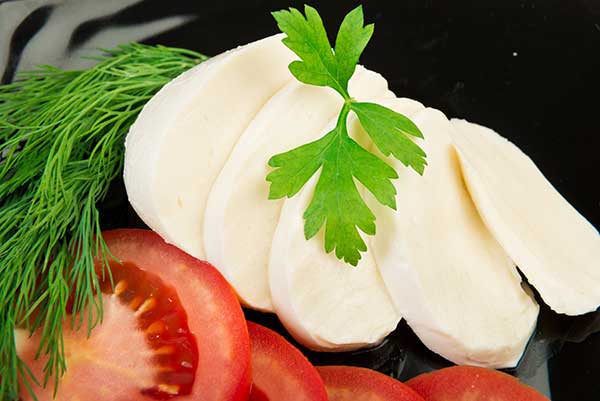
What Are The Potential Benefits Of Mozzarella Cheese For Dogs?
Mozzarella cheese is full of healthy nutrients that your dog might benefit from. A one-ounce serving of fresh mozzarella (about 28 grams) contains the following nutrients;
- Calories – 85
- Protein – 6 grams
- Fat – 6 grams
- Carbohydrate – 1 gram
- Calcium – 143 milligrams
- Sodium – 138 milligrams
Mozzarella cheese contains several other minerals and vitamins besides the above nutrients. They include vitamins A, B2, B12, and K-2, as well as phosphorus, zinc, omega-3 fatty acids, and conjugated linoleic acid (CLA).
Each of these nutrients may benefit your dog in some way.
1. Protein
Protein forms the building blocks of muscles and tissues. That makes it one of the core nutrients required in any animal’s diet.
Protein is also famous for its incredible filling effects. Therefore, the nutrient may help to prevent weight gain by minimizing the food portions your dog can eat in one sitting.
2. Calcium
Calcium promotes the development of healthy bones and teeth.
Calcium-rich diets like mozzarella cheese may help to protect your dog against bone fractures and degenerative bone diseases like arthritis.
3. Zinc
Zinc is a powerful antioxidant noted for its ability to strengthen the immune system and decelerate the natural aging process.
The mineral also accelerates wound healing and supports thyroid functions.
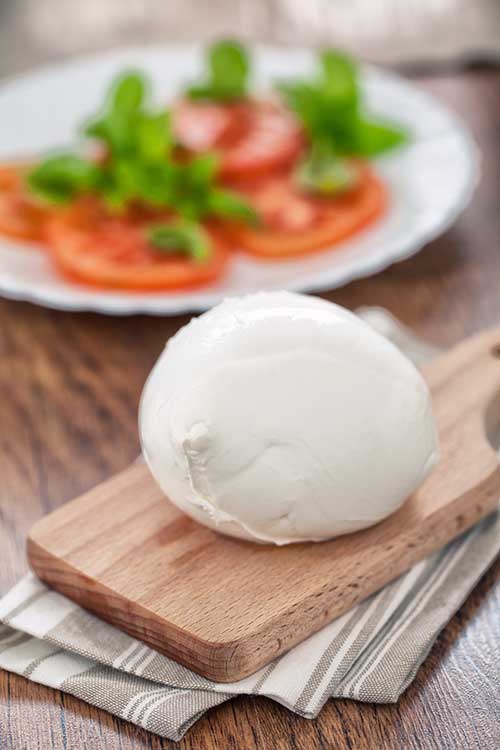
4. Phosphorus
Phosphorus is involved in muscle contraction and the removal of waste products from the kidneys.
The mineral may also work together with calcium to strengthen your dog’s teeth and bones. Plus, it plays a role in DNA and RNA synthesis.
5. Vitamin A
Is your dog’s vision starting to deteriorate due to old age or a chronic disease? If yes, then you might consider giving him mozzarella cheese or other foods rich in vitamin A.
Vitamin A may support your dog’s normal vision while also cushioning the animal from chronic eye problems like macular degeneration.
6. Vitamin B2
Also known as riboflavin, vitamin B2 is another mineral in mozzarella that dogs may benefit from.
The mineral is essential in various metabolic processes in the body, especially processes involved in energy production.
7. Vitamin B12
Vitamin B12 or cobalamin is a major co-factor in DNA synthesis.
Cobalamin may also work synergistically with riboflavin to promote energy synthesis.
8. Vitamin K-2
Vitamin K-2, also known as menaquinone, is one of the three K vitamins. The other two are vitamin K-1 and vitamin K-3.
Menaquinone promotes healthy skin and bones. It can also support heart health by inhibiting the calcification of blood vessels.
9. Fat
Fatty foods have garnered negative publicity over the years for their ability to induce weight gain. But fat serves crucial purposes in an animal’s body. The nutrient is a major substrate in energy synthesis.
Mozzarella cheese is particularly high in omega-3 fatty acids, which are known to support heart health.
The only problem with mozzarella is that the fat content in the cheese may be too high that even a teeny-tiny amount could prove more harmful than helpful.
- Helps When Nature Calls – These chicken-flavored treats contain Pumpkin and Bromelain, which have properties that support regularity and overall…
- Premium Digestive Support – Zesty Paws Advanced Probiotic Bites feature Prebiotics, Probiotics, and Digestive Enzymes to aid digestion, immune…
- Featuring PreforPro Prebiotic – Each chew contains 4mg of PreforPro, which is a premium pet Prebiotic that’s clinically proven to support healthy gut…
Last update on 2024-12-17 / Affiliate links / Images from Amazon Product Advertising API
10. Conjugated Linoleic Acid (CLA)
Conjugated linoleic acids (CLAs) are powerful antioxidants noted for their role in minimizing the risks of disease.
CLAs are particularly beneficial in lowering the risks of obesity, heart disease, and inflammatory disorders.
In addition to the above health and dietary benefits, mozzarella may also be used as a treat during canine training. Plus, the cheese offers an excellent way to conceal pills for dogs that require medications.
Is Mozzarella Cheese Ok For Dogs?
Having reviewed some of the potential health and nutritional benefits of mozzarella for dogs, you could now be wondering, can my dog eat mozzarella cheese?
Your dog can certainly eat mozzarella in small amounts. However, there’s still a lot more to know about this cheese before sharing it with your pooch.
The following section examines some of the risks of mozzarella for dogs.
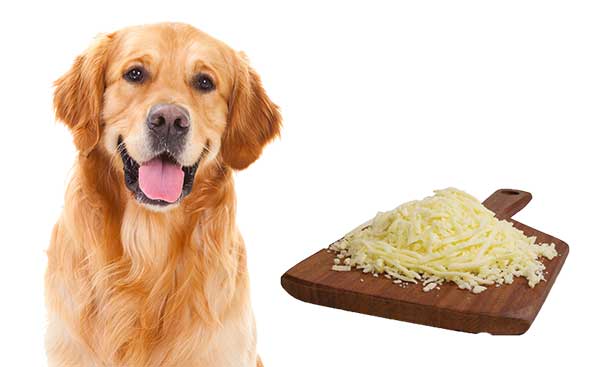
What Makes Mozzarella Cheese Potentially Harmful To Dogs
1. High-fat Content
Mozzarella cheese has worrying amounts of fats and calories. A one-ounce serving of the cheese contains as many as 6 grams of fat.
Now, we’ve already pointed out that fat plays a major role in energy production and storage. Some fats might even support the heart and cardiovascular system.
Unfortunately, the amount of fat in mozzarella cheese is too high that it’s likely to injure your dog than help him.
For starters, fatty foods are known to produce a laxative effect. So, feeding mozzarella cheese to your dog could induce undesired diarrhea.
Fat is also infamous for its role in weight gain. The continued consumption of mozzarella may lead to obesity and many other lifestyle diseases in dogs, such as heart disease, diabetes, and pancreatitis.
All these medical conditions may become debilitating in the long run. But pancreatitis deserves a special mention as it could grind your dog’s life to a halt in a matter of weeks. The disease is marked by the inflammation of the pancreas.
It produces severe gastrointestinal symptoms, such as vomiting, diarrhea, and abdominal pain. Other common symptoms include appetite loss, nausea, dehydration, lethargy, fever, and elevated pulse rate.
- HUMAN-GRADE: If you wouldn’t eat it, why would you feed it? From the ingredients they’re made with to the kitchens they’re made in, our treats…
- ALL NATURAL: Our kitchen-crafted Chicken Jerky Hip and Joint contains all natural whole muscle chicken breast, U.S. sourced chondroitin and…
- HIGH QUALITY INGREDIENTS: Truth is our first ingredient. We carefully cook our natural Chicken Jerky Hip and Joint in small batches using honest…
Last update on 2024-12-17 / Affiliate links / Images from Amazon Product Advertising API
Can overweight dogs eat mozzarella cheese?
Overweight dogs should avoid mozzarella. The high fat content in mozzarella cheese might trigger obesity in dogs. The situation can only get worse for dogs that are already overweight.
Can dogs eat low-fat mozzarella cheese then?
Mozzarella’s relatively high fat content is the main reason vets discourage this cheese for dogs. So, if you can find low-fat alternatives, then by all means go for them. However, remember to still serve the cheese to your dog in moderation to avoid any adverse effects.
2. Lactose Intolerance
Lactose intolerance is another major health concern with mozzarella for dogs.
Lactose intolerance occurs when animals that don’t produce lactase naturally, such as dogs, ingest lactose-containing foods. Lactose is a simple sugar found in many dairy products, while lactase is the enzyme that digests this sugar.
Since dogs don’t secrete the enzyme lactase naturally, any lactose-containing product is likely to present some problems for them.
Can lactose intolerant dogs eat mozzarella cheese?
Mozzarella cheese typically contains lactose by virtue of it being a dairy product. That makes the cheese potentially harmful for dogs. Common symptoms of lactose intolerance include vomiting, diarrhea, diminished appetite, and abdominal cramps.
The saving grace is that mozzarella contains less lactose than milk and most other cheese types. Even then, you want to proceed with caution while sharing the cheese with your canine friend.
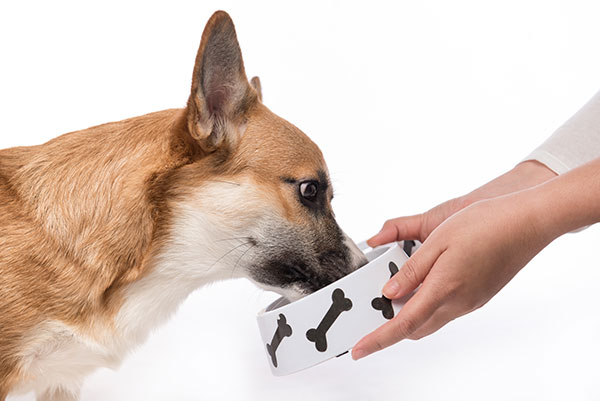
3. Allergic Reactions
We began by mentioning that dogs love cheese and that cheese is a common ingredient in dog food. But that doesn’t eliminate the risks of allergy.
Perhaps you’ve always wondered, are dogs allergic to mozzarella cheese?
Allergic reactions to mozzarella cheese are less common in dogs than cats. But the risks are still there.
Most dogs that react to mozzarella are usually those consuming the cheese for the first time. It’s worse if the animal consumes too much mozzarella than his stomach can handle.
Mozzarella allergy in dogs generally produces gastrointestinal symptoms like vomiting and diarrhea. Some dogs may also display respiratory symptoms like sneezing and coughing.
Is Mozzarella Cheese Bad For Dogs?
We’ve gone over some possible health benefits as well as potential side effects of mozzarella cheese for dogs. But for some reason, you could still be wondering, can mozzarella hurt dogs?
Although mozzarella cheese contains several nutrients that dogs might benefit from, the cheese seems to be more harmful than beneficial to dogs.
You can still go ahead and serve mozzarella cheese to your canine friend in moderation. But you’re probably better off shunning the cheese for healthier alternatives.
Can Mozzarella Cheese Kill A Dog?
Canine fatalities resulting directly from mozzarella consumption are almost unheard of. But that doesn’t mean they can’t occur.
Note that mozzarella cheese can produce several negative reactions in dogs. The side effects tend to be more severe to dogs consuming this cheese for the first time, as well as those who eat more than their ideal portions.
It may be easy to ignore mild episodes of vomiting and diarrhea. However, these symptoms could degenerate into dehydration, lethargy, and seizures in a matter of hours. Without timely interventions, your pooch could succumb.

Does The Type Of Dog Matter?
It’s not enough to understand the general benefits or negative effects of mozzarella cheese for dogs. You’d also do well to know the various aspects to consider before sharing this cheese with your dog. Some of those aspects include age, breed, and general health condition.
Can Puppies Eat Mozzarella Cheese?
Puppies can eat mozzarella cheese. But they probably shouldn’t.
A pup’s stomach is way more sensitive than that of a mature dog. So, even the smallest amount of mozzarella can irritate your pup’s digestive tract.
Can Elderly Dogs Mozzarella Cheese?
Just like puppies, elderly dogs should stay away from mozzarella.
Giving your aging pooch measured portions of mozzarella cheese occasionally as a treat is fine. The problem comes when you increase the feeding frequencies and portions.
The biggest problem with mozzarella cheese for elderly dogs is that aging dogs are highly susceptible to most lifestyle diseases commonly induced by mozzarella, such as obesity, diabetes, and pancreatitis.
- Heart, Liver & Immune Health – Multifunctional Dog Supplements feature CoQ10, Cod Liver Oil and Vitamins A, C, & E to promote healthy cardiovascular…
- 8-in-1 Formula – Zesty Paws Multifunctional Bites are dog supplement chews with premium ingredients that support physical performance, antioxidants,…
- Skin Health & Antioxidants – For dogs with sensitive skin, this dog vitamins for skin and coat allergies formula contains Cod Liver Fish Oil and…
Last update on 2024-12-18 / Affiliate links / Images from Amazon Product Advertising API
Can Diabetic Dogs Eat Mozzarella Cheese?
Diabetic dogs should avoid mozzarella cheese.
Note that mozzarella is a risk factor for diabetes. That means the cheese may also worsen diabetes symptoms.
The main reason diabetic dogs should avoid mozzarella is that the cheese is relatively high in sugars and fats. High blood sugar and fat levels is a major risk factor for type 2 diabetes.
Can Dogs With Kidney Disease Eat Mozzarella Cheese?
Dogs with kidney disease should avoid mozzarella cheese. That’s especially true for processed cheese, which usually contains brine as a preservative.
Brine, or concentrated salt solution, may trigger sodium ion poisoning in dogs. The condition produces fever, excessive drinking (followed by frequent urination), seizures, and tremors.
Sodium ion poisoning is a leading cause of kidney failure in pets.
Can Pregnant Dogs Eat Mozzarella Cheese?
Pregnancy is associated with depressed immunity. So, pregnant dogs shouldn’t eat mozzarella cheese.
Can Nursing Dogs Eat Mozzarella Cheese?
The rules of mozzarella cheese for expecting canines also apply to lactating ones. Therefore, it goes that nursing dogs shouldn’t eat mozzarella cheese either.
Is There A Right Way to Feed Mozzarella Cheese to Dogs?
You may have weighed all the benefits and drawbacks of mozzarella cheese for dogs and decided to share this cheese with your pooch. Well, your next question should be how best to serve the food to your canine friend.
Below are several precautions to take when feeding mozzarella cheese to your dog;
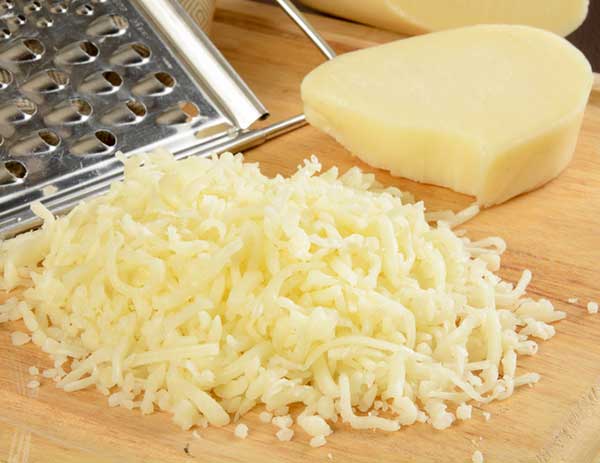
1. Insist On Fresh Mozzarella
Fresh mozzarella cheese, in this respect, refers to mozzarella that’s prepared naturally without the use of chemical additives. The term is mainly used in contrast to industrially-manufactured mozzarella.
Can dogs eat fresh mozzarella cheese or should I consider store-bought cheese?
Fresh mozzarella is preferable for dogs to store-bought one. That’s because fresh mozzarella is unlikely to have toxic chemicals.
If you must give your dog processed cheese, beware of the amount of salt and fat in the cheese. Also, keep your eyes out for chemical additives like glutamic acid (monosodium glutamate).
2. Practice Moderation
One frequently asked question among dog owners who love mozzarella is, ‘how much mozzarella cheese is safe for dogs?’
When it comes to mozzarella for dogs, there’s no such thing as one-size-fits-all. The portions of mozzarella to give your dog depend on the animal’s age, body weight, and general immunity.
However, the conventional wisdom is to feed mozzarella to your dog sparingly. Start with a pea-size bite and observe the dog for any side effects before possibly increasing the servings.
3. Make It an Occasional Treat
It’s not enough to give your dog little amounts of mozzarella cheese. It’s also recommended to serve the cheese only as an occasional treat.
Once a month would be ideal for new mozzarella eaters. Dogs who’ve already been introduced to the cheese can consume it once a week.
So, can dogs eat mozzarella cheese every day?
No, dogs shouldn’t eat mozzarella every day. Once a week or at least once every several days would be great.
- Works as a dog food topper – For pet parents looking for an alternative to capsules, raw treats, or soft chews, all it takes is a few pumps of Salmon…
- A tasty & body nourishing treat for cats & dogs – Essential fatty acids for a healthy coat.
- Powerful Omega Fatty Acids – This premium fish oil liquid formula is loaded with the healthy Omega-3 fatty acid (with epa and dha) to support health…
Last update on 2025-01-15 / Affiliate links / Images from Amazon Product Advertising API
Other Frequently Asked Questions About Mozzarella And Dogs
Can dogs eat mozzarella cheese pizza?
The safety of mozzarella cheese pizza for dogs depends on the ingredients in the pizza, especially the toppings. Avoid giving your dog mozzarella pizza topped with spices in the Allium family, such as garlic and onion.
Can dogs eat whole milk mozzarella cheese?
Whole milk mozzarella cheese contains a higher amount of lactose than standard cheese. That makes it potentially harmful to dogs.
Can dogs eat shredded mozzarella cheese?
Shredded mozzarella cheese is easier for dogs to digest. Just be sure to serve the cheese to your pooch sparingly.
Can dogs eat mozzarella cheese sticks?
Mozzarella cheese sticks may be delicious. But they usually contain too many spices and seasoning that make them potentially harmful to dogs.
Can dogs eat mozzarella string cheese?
Dogs can eat mozzarella string cheese provided that the cheese contains all ingredients considered safe for dogs.
Is Mozzarella Cheese Good For Dogs?
Dogs can eat mozzarella cheese occasionally and in moderation. However, mozzarella should never replace your dog’s regular diet.
It’s also important to insist on fresh mozzarella. Shun products laced with salt, spices, and fats, as these substances could cause devastating effects on your dog.
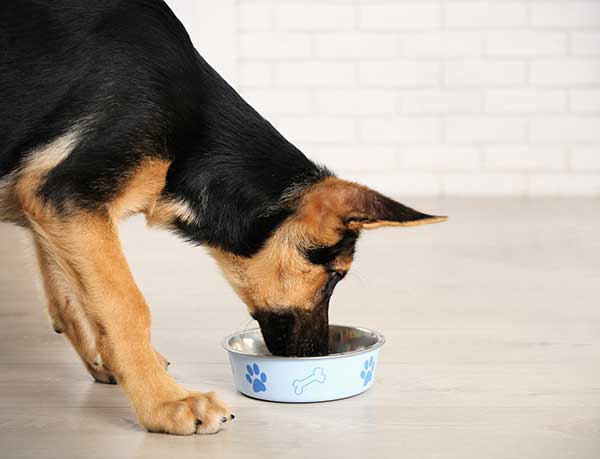
Checkout Our Favorite Dog Products
1. BEST PUPPY TOY
We Like: Snuggle Behavior Toy with Heart Beat & Heat Pack – Ideal toy for new puppies.
2. BEST DOG TRAINING PROGRAM
We Like: Doggy Dan The Online Dog Trainer – Stop any dog problem and raise the perfect puppy with The Online Dog Trainer.
3. BEST DOG PUZZLE TOY
We Like: Outward Hound Interactive Puzzle Toy – Every dog loves chasing squirrels at the park. The Outward Hound Hide-a-Squirrel Puzzle Toy gives your dog the same feeling as though he was outdoors chasing live squirrels.
4. Best Bone Broth for Dogs
We Like: (Solid Gold – Human Grade Bone Broth for Dogs) – Simmered Beef Bone Broth With Turmeric Provides A Nutrient-Dense And Flavorful Addition To Your Dog’s Meal + Rich In Natural Collagen From Beef Bones.
5. Best Multivitamin for Dogs
We Like: PetHonesty 10-For-1 Multivitamin – 10 Benefits in 1 Daily Treat – These Multivitamin Snacks combine a well-rounded blend of the most essential vitamins and supplements including glucosamine, probiotics, vitamins and omegas, for dogs’ overall daily health.






